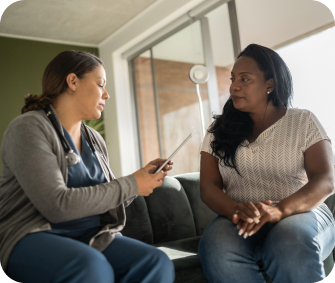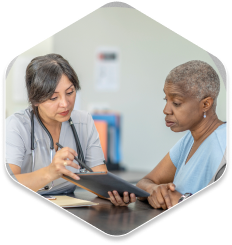
Managing cancer-related effects
Speak up early and often about how you’re feeling so your care team can help you get the support you need. Track your symptoms to share with your care team and learn tips to help manage them at home.
How can I track my side effects and symptoms?
Tracking your side effects and symptoms can help you identify issues early and get the help you need to manage them.
Here are some ways you can track and report your symptoms and side effects to your care team:
Use a symptom tracker and share it with your care team at your next visit
You may want to use a journal, note in your phone, or a mobile app. Be sure to track the symptom and any relevant details. You can also ask a caregiver to help track your symptoms or help you speak up during conversations with your care team
Call a member of your care team to speak with someone right away
Your care team is here to support you and help find answers to your questions. Reach out as soon as a symptom starts so they can help you know what to do next. Know that different members of your cancer care team can help you manage your symptoms
Communicate with your care team through your patient portal, if available
If you are not sure if you have a patient portal or need help accessing it, you can contact your health care provider’s office for assistance
Adjusting to the changes within your body can take time, but speaking up to your care team early and often is important.
If you experience a true medical emergency, contact emergency services.
Common cancer-related side effects and symptoms
Side effects can be different for each person, even when getting the same type of cancer treatment, and they can occur at any time during or after your treatment. It’s important to share what you’re experiencing with your care team so they can help manage any side effects. And while these effects could relate to your cancer or cancer treatment, there could be other causes to explore with your healthcare team.
The information below is based on information originally published by organizations such as the National Cancer Institute (NCI) and the American Cancer Society (ACS). This is not a substitute for professional medical advice, and you should always seek guidance from your doctor.
Here are some tips that may help you manage a few common cancer-related side effects and symptoms:
Cancer-related fatigue is different from normal tiredness. It can make your entire body feel weighed down, and it doesn’t go away with rest. It can even affect your daily life—impacting your ability to enjoy time with loved ones or continue to work. For some, cancer-related fatigue may improve after treatment ends, but for others, the effects of fatigue may linger much longer.
When you feel fatigued (very tired or weak and you don’t feel better even after resting), you can:
- Take quick naps of 30 minutes or less to help give you more energy
- Get a good night’s sleep of 7-8 hours each night, and try to maintain a consistent sleep routine
- Spread out your errands and tasks throughout the day
- Ask friends and family for help with tasks that are hard for you
- Try to reduce stress by practicing yoga or meditation, getting a massage, or speaking with a counselor to help you cope
- Do physical activities you enjoy like walking, swimming, riding a bike, or weight training, which may help give you more energy

When you have diarrhea (loose or watery stools more often than what is normal for you), you can:
- Drink plenty of water and other clear liquids, like weak tea, apple juice, clear broth, or jello, to stay hydrated
- Avoid tobacco, alcohol, and caffeine
- Avoid certain foods, like spicy foods, foods high in sugar, acidic foods, and foods that upset your stomach
- Try the BRAT diet, which includes eating bananas, rice, applesauce, and toast
- Talk to your care team about possible medicines to help manage your diarrhea

When you have nausea (an unpleasant feeling in the back of the throat and stomach that can cause vomiting), you can:
- Drink clear liquids, like water or broth, and ice-cold drinks
- Avoid foods that are fried, greasy, spicy, or sweet
- Avoid alcohol and coffee
- Eat smaller meals more frequently to avoid an empty stomach, which may make nausea worse

When you experience mental or emotional health changes (such as feelings of anxiety and distress), you can:
- Talk to someone like a therapist or clergy member
- Reach out to a social worker at the hospital who may be able to connect you with local support groups
- Use coping methods like yoga, writing, music, or pet therapy, which have been shown to help
- Ask your doctor about treatment options that might be right for you
Remember that some days will be better than others, and it’s OK to not feel perfect every day. Take things one moment at a time.

When you experience sexual health changes (any concerns about your sexual health), you can:
- Start the conversation with your care team. Share your concerns about your sexual health, such as unwanted changes to your sex drive
- Share any fertility goals. If you have goals around fertility and having children, your care team may be able to help
- Ask for a recommendation for a sexual health specialist, if needed
- Keep talking with your care team. The more you talk about sexual health concerns, the more comfortable it will become, and the more answers you’ll get

You are encouraged to report negative side effects of prescription drugs to the US Food and Drug Administration (FDA) by calling the FDA at 1-800-FDA-1088. You may also report to the FDA online.
Who is on my care team?
Your care team can help you through your entire journey. Find out who may be part of your care team and how each team member supports you.
You may also want to read…
US-KEY-08210 09/24




